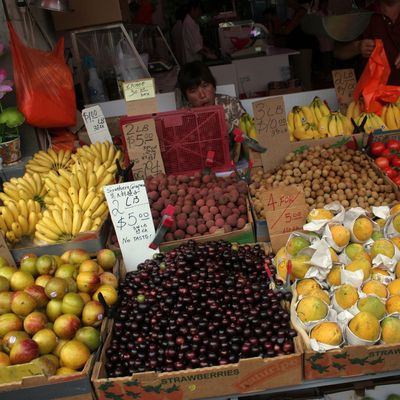
As anyone who’s spent an afternoon nibbling on roast pork while perusing the markets of Chinatown can attest, the neighborhood’s streets are home to an astounding variety of produce and vendors. In terms of fruits and vegetables, it’s an unparalleled shopping destination for the home cook in New York. This is in large part thanks to the remarkably cheap prices, but also the fact that you can consistently find new things to cook. The Wall Street Journal toured the neighborhood with economic botanist and From Farm to Canal Street author Valerie Imbruce, who filled the paper in on how the Chinatown produce economy works and why, contrary to what you might think, the greens are actually good. Here are six takeaways:
• You really can’t exaggerate this kind of variety. Imbruce counted 200 different fruits and vegetables, ranging from lots and lots of cherries to multiple varieties of choy and jackfruit, but also celtuce, long beans, bitter melon, dragon fruit, and all of the durian your heart could desire.
• Chinatown’s produce markets aren’t cheap because they’re peddling second-rate products, but because they’re actually kind of farm to vendor. Operators are linked to a network of small family farms, like home gardens in south Florida, and minor wholesalers that function independently of those that supply most supermarkets.
• Low overhead — no credit cards, minimal staffing, and makeshift sidewalk stands — and collaboration among vendors to get bulk discounts means you’re paying as close to wholesale prices as you ever will. Chinatown’s markups typically run as low as 10 to 12 percent and don’t just beat Whole Foods (a.k.a Whole Paycheck), but also affordable chains like Key Foods.
• The farmers are doing okay, too. For her book, Imbruce visited 75 farms that supply Chinatown and found that most farmers were happy because growing a variety of crops for these small wholesalers leads to more economic and agronomic stability.
• Always keep your eyes peeled for deals, which vary daily, and cook accordingly.
• Be flexible. Get out of the office early and hit the streets at 5 p.m., when vendors try to sell excess inventory before the day is over. Also look for bargains on day-old produce.
[WSJ]





